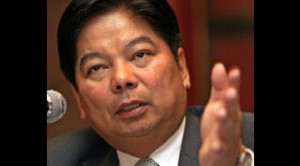
Bangko Sentral ng Pilipinas Governor Amando M. Tetangco Jr.: More owners, more points of view. INQUIRER FILE PHOTO
MANILA, Philippines–The Philippines’ richest families may be ordered to loosen their grips on the nation’s largest banks as regulators seek to turn lenders’ boardrooms from the autocracies that they are into democracies they should be.
“You have more points of view when you have more owners so that can actually improve operations of banks,” Bangko Sentral ng Pilipinas Governor Amando M. Tetangco Jr. said on Wednesday.
Speaking at the Shareholders Association of the Philippines’ (SharePhil) annual membership meeting, the central bank chief said the existing minimum public float for listed firms might be on the “low side.”
The Philippine Stock Exchange (PSE) requires all listed firms to have at least 10 percent of their common shares to be in the hands of minority investors.
Most local businessmen that take their companies public refuse to give up control of their firms and still hold majority of its shares. This is true for the country’s top three banks, namely BDO Unibank, Metropolitan Bank & Trust Co., and Bank of the Philippine Islands, which are all still majority owned by the families that took them public.
Tetangco said publicly listed universal banks should be made to list more of their shares on the PSE to accommodate more investors. Having more owners in any publicly-held firm can improve accountability because managers have a more diverse set of board members to answer to.
“We’re looking at that. Personally, in other countries, 10 percent is really small. We want to broaden the ownership base,” Tetangco said.
This comes amid corporate governance issues that struck larger overseas lenders, which, with the complicity of their board of directors, allowed managers to take excessive risks that led to massive losses. Taxpayers in advanced economies had to absorb these risks to billion-dollar government bailouts.
SharePhil, an organization that wants to improve the way boardrooms of publicly listed firms are run, said the Philippines was the worst-performing country in terms of corporate governance standards.
Among the issues cited by SharePhil were the non-disclosure of salaries of executives and board members, and weak regulators, excluding the BSP.


